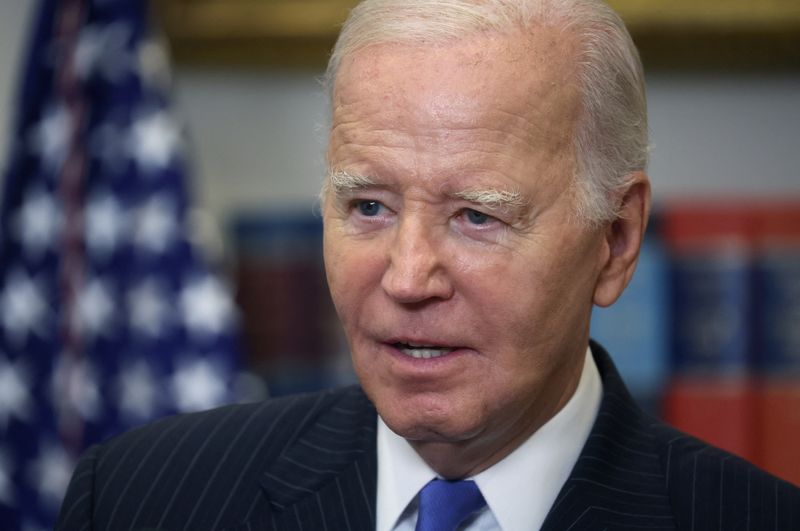By Steve Holland and Matt Spetalnick
WASHINGTON (Reuters) -U.S. President Joe Biden offered Israel on Saturday "all appropriate means of support" after a deadly attack from Palestinian militant group Hamas and warned "any party hostile to Israel" not to seek advantage.
U.S. and Israeli officials were coordinating about Israel's military needs in the wake of the attack, with a decision expected soon, a senior U.S. official said.
The United States is working with other governments to make sure the crisis does not spread and is contained to Gaza following a deadly Hamas attack in Israel, the official said.
"We want to make sure this is contained in Gaza," the official told reporters.
The assault by the Iran-backed Islamist group erupted amid efforts by Biden and his team to negotiate a landmark normalization agreement between foes Israel and Saudi Arabia and a U.S.-Saudi defense pact.
Biden spoke by phone to Israeli Prime Minister Benjamin Netanyahu on Saturday to offer U.S. support, with scenes of violence playing out on American news networks. The two leaders have had strained relations but met in New York last month in a show of solidarity.
"I made clear to Prime Minister Netanyahu that we stand ready to offer all appropriate means of support to the government and people of Israel," Biden said in a written statement issued after their call.
In his televised remarks later, Biden issued a blunt warning.
"Israel has a right to defend itself and its people - full stop," he said. "Let me say this as clearly as I can. This is not a moment for any party hostile to Israel to exploit these attacks to seek advantage. The world is watching."
The senior U.S. official, speaking on a conference call, said there was no indication yet that Iran was involved in the Hamas attack but vowed to look into it.
Amid worries about a massive Israeli intelligence failure, the official said Washington had no specific warning or indication that Hamas would launch the attack.
"We always share timely intelligence," the official said.
Biden directed his national security team to stay in touch about the situation with countries throughout the region including Egypt, Turkey, Qatar, Saudi Arabia, Jordan, Oman, the United Arab Emirates and European allies.
The violence came as Washington was in disarray: Republicans are looking for a successor to ousted Speaker Kevin McCarthy of the House of Representatives, and a budget showdown looms with Biden and his Democrats that could lead to a government shutdown in about 40 days.
Biden's choice to be U.S. ambassador to Israel, former Treasury Secretary Jack Lew, has yet to be confirmed by the U.S. Senate.
IRAN CRITICISM
Republicans seeking to oust Biden in the 2024 presidential election were quick to criticize his handling of the situation.
"Iran has helped fund this war against Israel, and Joe Biden's policies that have gone easy on Iran has helped to fill their coffers. Israel is now paying the price for those policies," said Florida Governor Ron DeSantis, a Republican running for his party's presidential nomination.
DeSantis appeared to be referring to a prisoner swap deal the Biden administration completed with Iran in September. The deal was first made public in August. Under the deal, the United States waived sanctions to allow the transfer of $6 billion in Iranian funds from South Korea to Qatar, a step needed to carry out the U.S.-Iran prisoner swap.
A Biden administration official said not a dollar of the $6 billion has been spent yet. The money is intended solely for humanitarian purposes.
"I can't comment on 2024 because of the Hatch Act. But I can clarify the facts: Not a single cent from these funds has been spent, and when it is spent, it can only be spent on things like food and medicine for the Iranian people," said White House National Security Council spokesperson Adrienne Watson.
The Hatch Act prohibits White House officials from engaging in political activity.
Brian Nelson, a senior Treasury Department official, said: "All of the money held in restricted accounts in Doha as part of the arrangement to secure the release of five Americans in September remains in Doha."
The impact of the Hamas attack on the U.S.-Israel-Saudi normalization negotiations was unclear, but the U.S. official said Washington would not let the militant group derail the talks.

The United States has been insistent any agreement include some Israeli concessions to the Palestinians, but what those would be remained a subject of negotiations.
Reuters reported last month that Saudi Arabia is determined to secure a military pact requiring the United States to defend the kingdom in return for opening ties with Israel, and will not hold up a deal even if Israel does not offer major concessions to Palestinians in their bid for statehood.